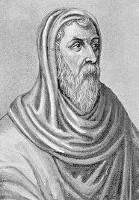









 In the “Nuts and Bolts” series, I lay out some of the fundamental ideas and terms used in philosophy and theology for the lay person.
In the “Nuts and Bolts” series, I lay out some of the fundamental ideas and terms used in philosophy and theology for the lay person.
This time I’m looking at kenosis (also referred to less elegantly as kenoticism). Unfortunately, this is one of those terms which in some contexts generates more heat than light. If you search the internet for the term it’s likely that some of the first results you’ll find are extreme statements about the “heresy of kenosis.” Today I found one gem, for example, which claims that “The doctrinal heresy known as Kenoticism originated in the nineteenth century by the German theologians.”
Kenosis, however, is neither heretical nor German, and certainly did not arise in the nineteenth century, even though some nineteenth century German theologians may have formulated the idea in ways that others had not. Far from being an invention of modern Europe, kenosis has a long history in Eastern Orthodox Christianity, a significant branch of the church that many moderns are frankly ignorant of (moderns often including myself).
Read More
 This episode asks the question: “What is Faith”? Is it, as some maintain, just believing things for no good reason? When Christian thinkers over the years have spoken of having faith, what have they been talking about? Listen and find out!
This episode asks the question: “What is Faith”? Is it, as some maintain, just believing things for no good reason? When Christian thinkers over the years have spoken of having faith, what have they been talking about? Listen and find out!
 In the “Nuts and Bolts” series, I lay out some of the fundamental ideas and terms used in philosophy and theology for the lay person.
In the “Nuts and Bolts” series, I lay out some of the fundamental ideas and terms used in philosophy and theology for the lay person.
 Time to go to Sunday School. I was prompted to write this one just because the doctrine of original sin is one that I have never personally heard a sermon on in all the churches that I have attended. Now that’s not to say that these churches reject the idea, but it does mean that for a lot of Christians, they haven’t been directly taught about it. I don’t want to presume to teach people stuff they already know, but at the same time I thought it couldn’t hurt to do my part to make sure that Christians actually understand their theological heritage. So here’s my take on the doctrine of original sin.
Time to go to Sunday School. I was prompted to write this one just because the doctrine of original sin is one that I have never personally heard a sermon on in all the churches that I have attended. Now that’s not to say that these churches reject the idea, but it does mean that for a lot of Christians, they haven’t been directly taught about it. I don’t want to presume to teach people stuff they already know, but at the same time I thought it couldn’t hurt to do my part to make sure that Christians actually understand their theological heritage. So here’s my take on the doctrine of original sin. Is Christian hope all about going to heaven, rather than you-know-where?
Is Christian hope all about going to heaven, rather than you-know-where? Here it is, Episode 18. Here I draw on the work of the fourth century bishop of Alexandria, Athanasius. His work called The Incarnation of the Word is my all-time favourite work from the Church Fathers, and I think it gives us excellent theological reasons for adopting annihilationism. Along the way, it invites a theological storm over what it meant for Christ to become subject to death as one of us.
Here it is, Episode 18. Here I draw on the work of the fourth century bishop of Alexandria, Athanasius. His work called The Incarnation of the Word is my all-time favourite work from the Church Fathers, and I think it gives us excellent theological reasons for adopting annihilationism. Along the way, it invites a theological storm over what it meant for Christ to become subject to death as one of us.
